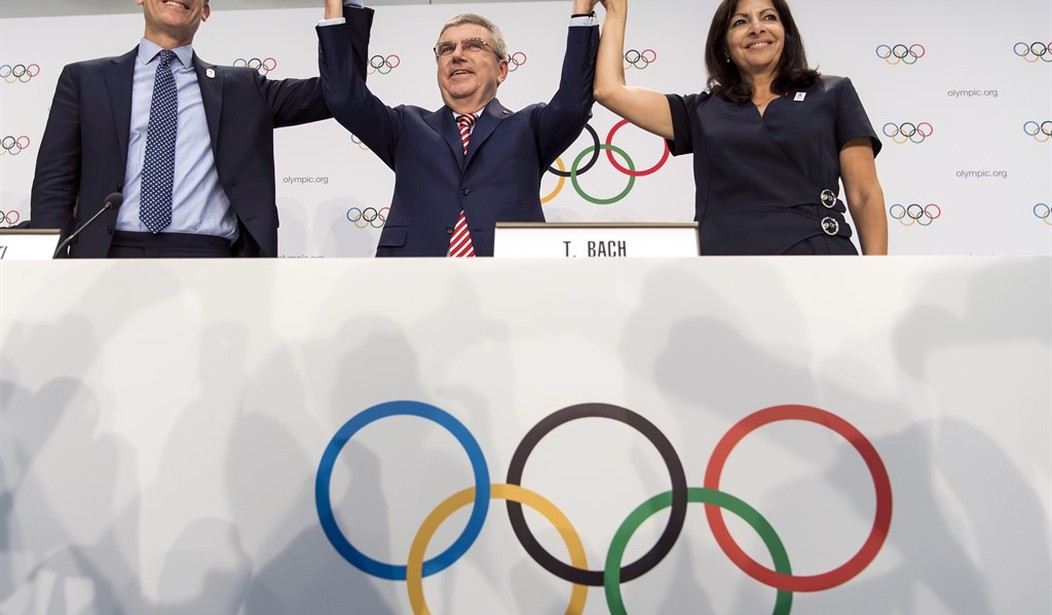Angelenos have to hope that the third time is as charmed as the first two. Los Angeles became the second city in the world to host three modern Olympics with a deal clinched yesterday between the International Olympic Committee and Paris, which will host the summer games in 2024. The Olympics will return to Southern California in 2028, forty-four years after hosting one of the more successful Olympiads, and ninety-six years after their first hosting duties:
The Summer Olympics are returning to the U.S. for first time since 1996. The 2028 Games will be held in Los Angeles https://t.co/DV7OCKBgW2 pic.twitter.com/vKHTIAUw8T
— CBS News (@CBSNews) August 1, 2017
For its willingness to take the second position, LA got some financial concessions from the IOC. The cost of the games will still amount to slightly over $5 billion, but that could be a bargain compared to more recent Olympiads:
The competition between L.A. and Paris, which began as a simple race for 2024, grew more complex when the IOC — with two eager candidates in hand — decided to name two winners.
L.A. was expected to go second if only because it was willing to consider the option. It knew that the race with Paris would be close and that the U.S. had fallen short in several recent attempts to win the Summer Games. Paris, by contrast, had pushed back against waiting another four years.
Los Angeles Mayor Eric Garcetti, who spearheaded the city’s campaign, said the terms of Monday’s agreement should outweigh any increased uncertainty that comes with committing to a major event more than a decade in advance.
L.A.’s bid committee has estimated it would cost $5.3 billion to stage the Games and has predicted it can cover all expenses through revenues such as sponsorships and ticket sales.
How much of a bargain? Brazil claims they spent $13 billion to stage the Rio Olympics last year, split between private and public funds. Outside analysts put the total closer to $20 billion. Either way, it didn’t do much for Rio de Janeiro that Brazil couldn’t have done on its own, including the subway system that got overbilled by as much as 25% because of the rush to meet the deadline for the games. The most visible improvement is a restructured port system, but that mainly improves the lot of tourists rather than the poverty-stricken and crime-ridden city. Still, it could be worse; Russia reportedly poured over $50 billion into the Sochi winter Olympics in 2014, whose most memorable moment may have been Vladimir Putin’s paean to communism during the opening ceremonies.
In the end, Los Angeles got 2028 by default, argues Yahoo’s Dan Wetzel. The IOC was “terrified” by the prospect of having to turn down either city for 2024 and cut the deal with LA to avoid it. That doesn’t mean Angelenos are done with defaults either, Wetzel warns:
You can’t blame the rest of the world, or even Americans, for their apprehension and disinterest in hosting the Olympics, which used to be incredible moments of possibility and civic pride. What everyone has discovered is that the politician promises and clear-minded budgets never seem to come true.
The Olympics are a great party. Developers and IOC officials benefit mightily. Then it ends, everything is a mess and the taxpayers are left holding the bag as they survey the crumbling of abandoned, once gold-plated stadiums.
It’s thus essential for Los Angeles to make sure it isn’t another Rio or Sochi or anywhere else.
It’s also imperative that the IOC does its part to assure it too, because its list of suckers is running thin and it can’t afford to have a string of hosts get wiped out due to largesse. If the four-Olympic run of Tokyo (Summer 2020), Beijing (Winter 2022), Paris (Summer 2024) and Los Angeles (Summer 2028) can’t do it, then who the heck can? No small locations there.
There is one bright spot in this doom and gloom, however, and that is … Los Angeles. Angelenos proved they know how to make an Olympics work in 1984, while I still lived in my native Southern California. Thanks to a great deal of existing world-class sports infrastructure, the need for new construction of facilities was low and investment could go into transportation and other needs. The city reorganized its traffic, barring heavy commercial vehicles from the freeways and highways during daylight hours, which spectacularly succeeded in alleviating traffic jams. Security issues may have been less of a concern compared to today, but it wasn’t a low priority either, and the games went off without a hitch (and without the Russians, for that matter).
Despite the age of the Olympic Colosseum, built for the 1932 Olympiad, that LA advantage still holds true and is likely to be even better by 2028, with a new NFL stadium already under construction for most of the outdoor events. The Metro rail system adds travel capabilities throughout the main area of the Southland, and it has even more capacity than before for venues, hotels, and other accommodations. All Garcetti & Co need to do is to dust off the plan from 1984 and add a few updates in order to pull off another profitable and successful Olympics. And now they have even more lead time than usual to prepare for it.
If Los Angeles can’t make it work, then no one can, and Wetzel’s prediction of the end of the Olympics as we know it will probably come true. But even if LA does succeed, the IOC has to stop handing out the games to undersized and undercapitalized cities without the requisite infrastructure already in place for an international event of this size. Otherwise, the IOC will kill the Olympics all on their own.








Join the conversation as a VIP Member